CIVIL LAW Lecture 11 Common property

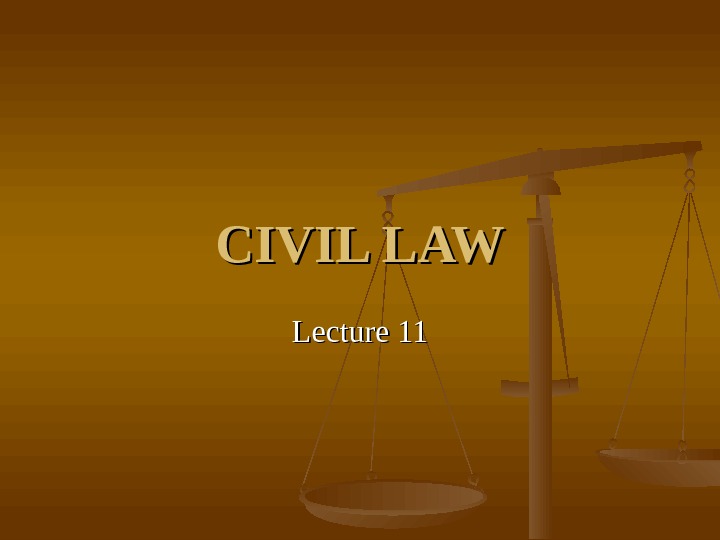
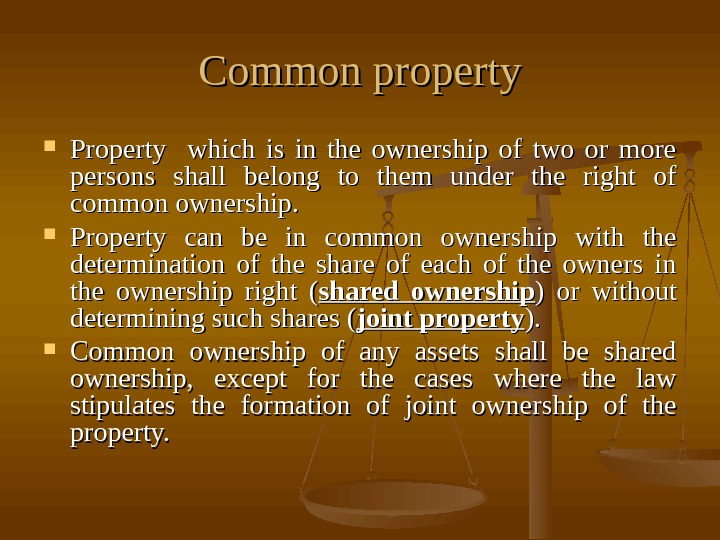
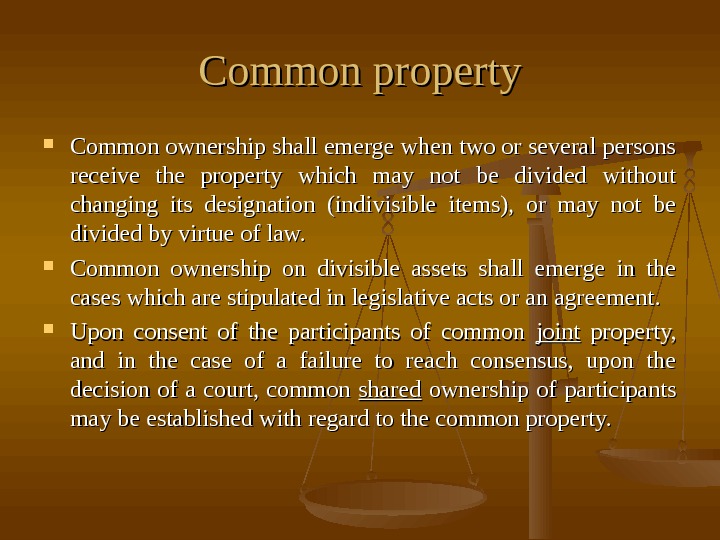
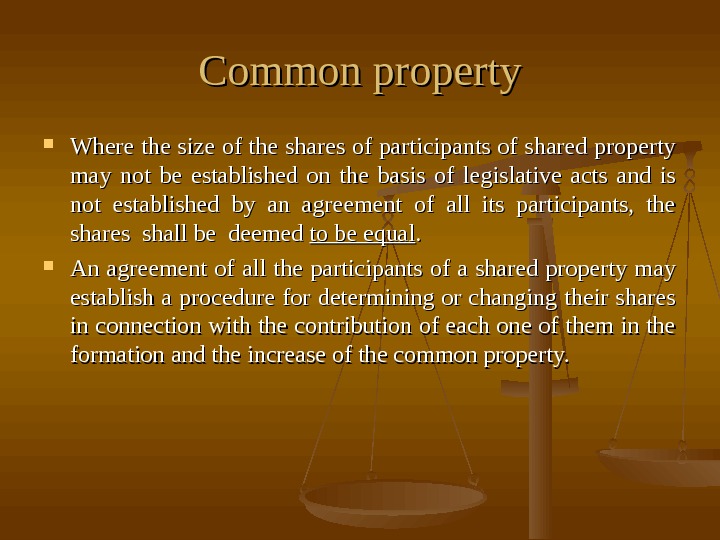
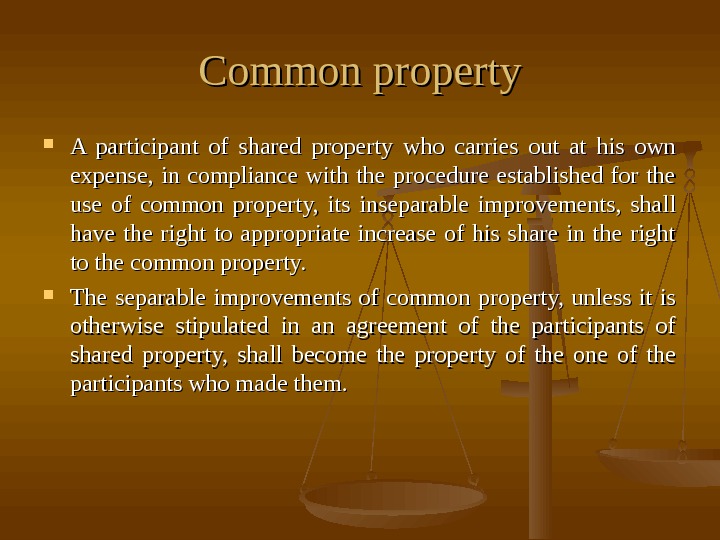
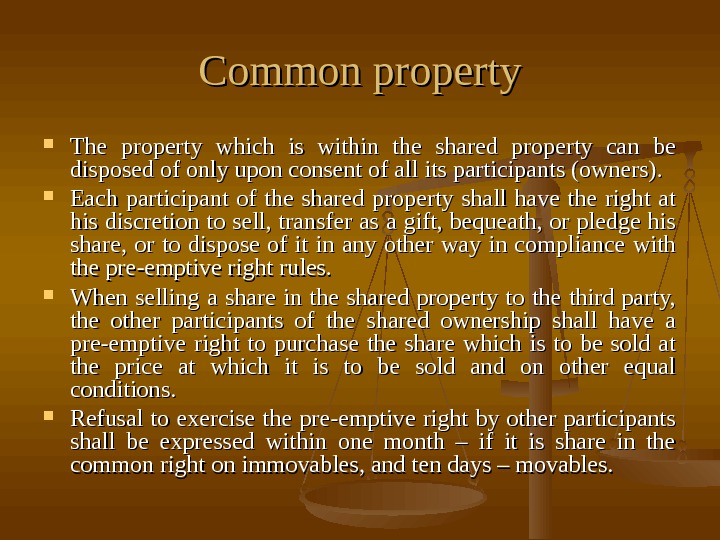
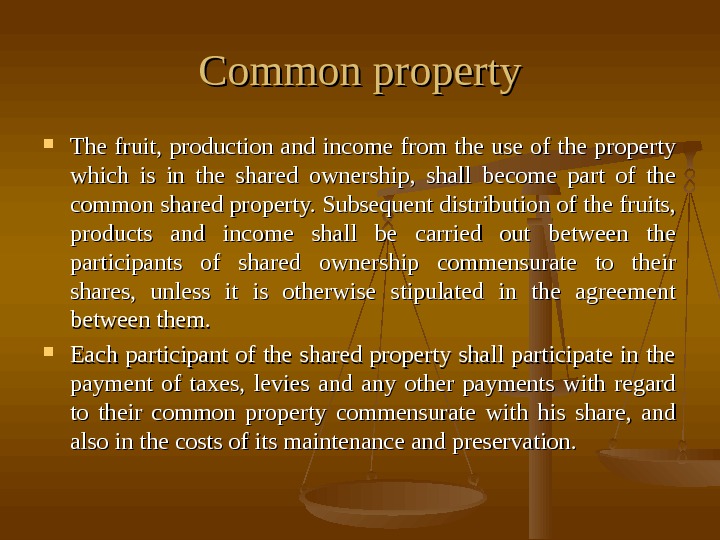
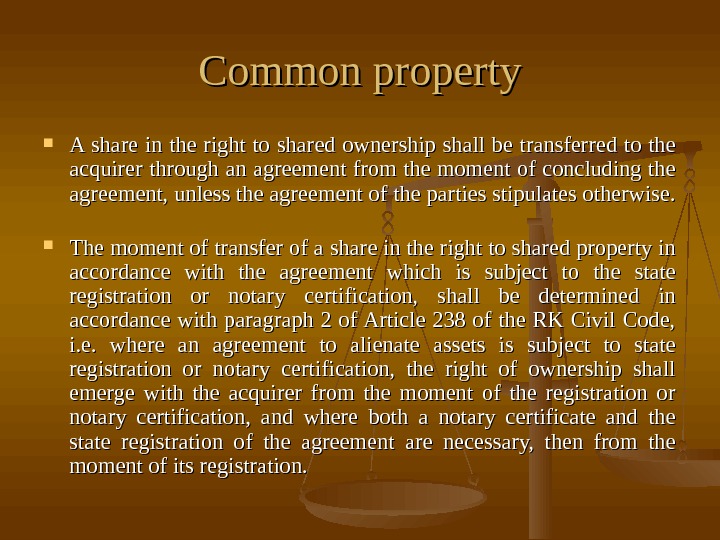
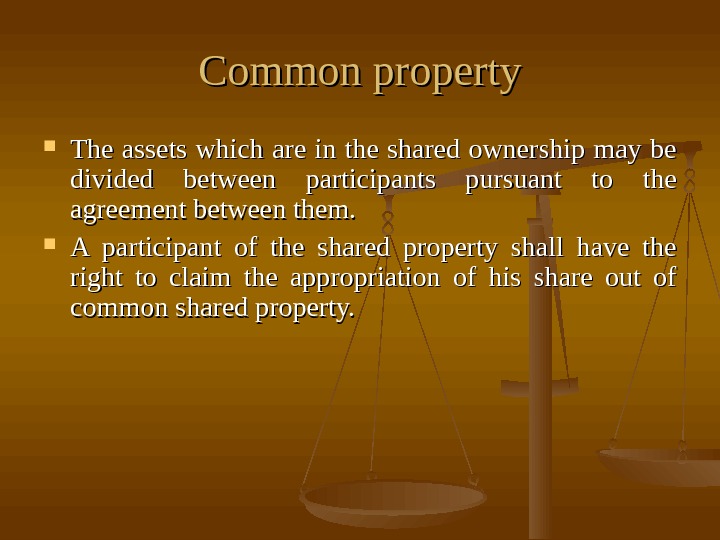
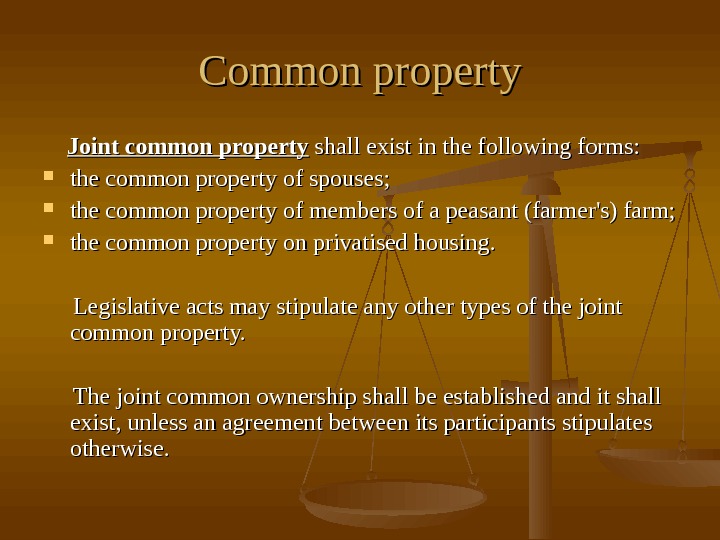
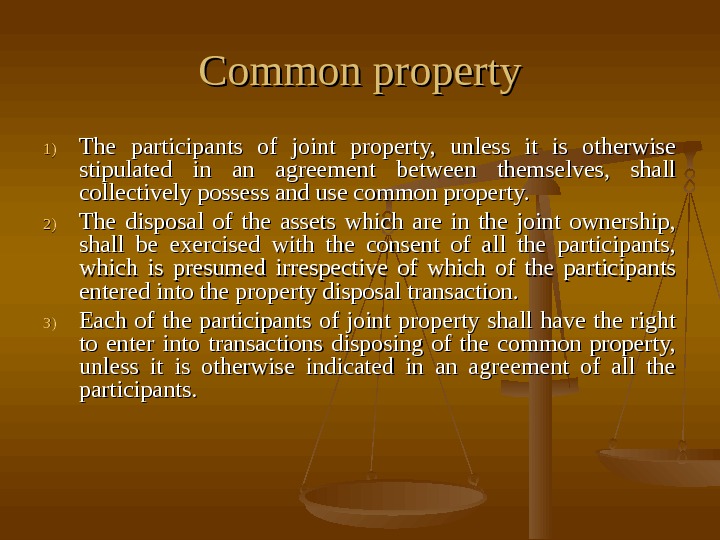
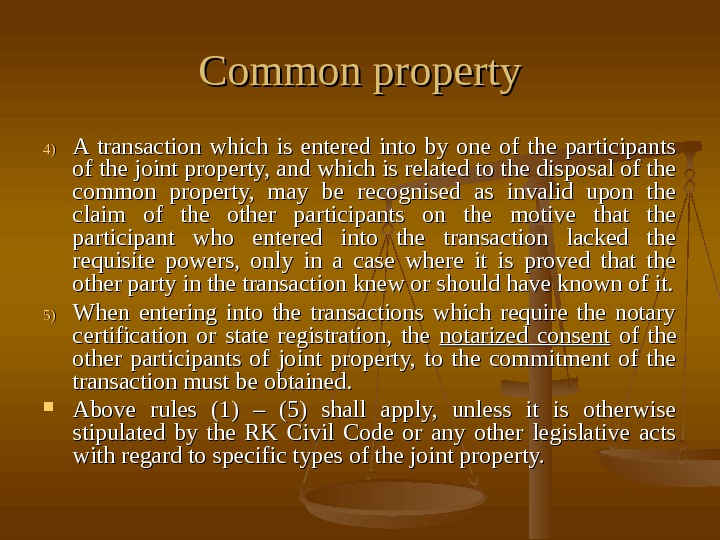
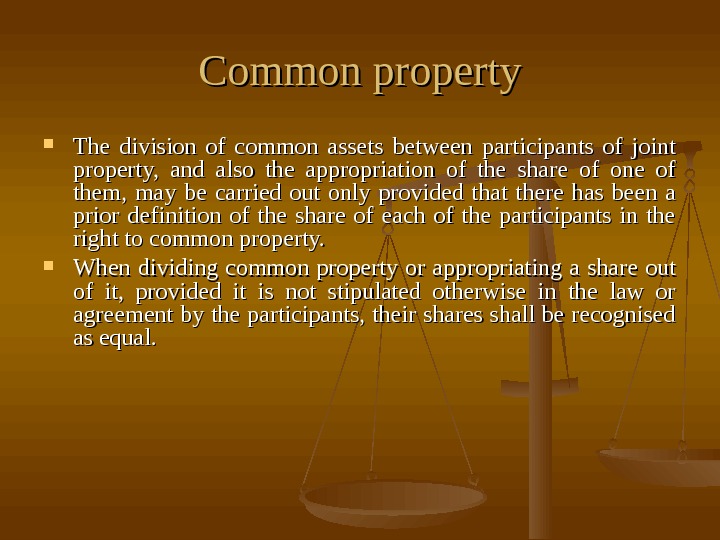
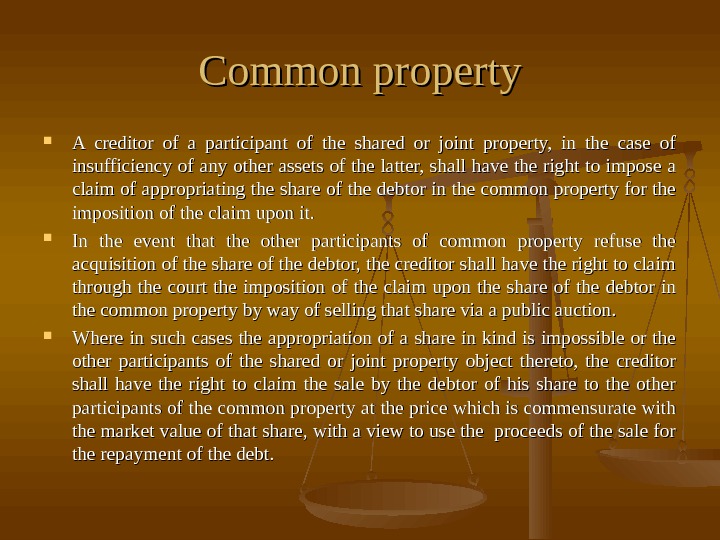
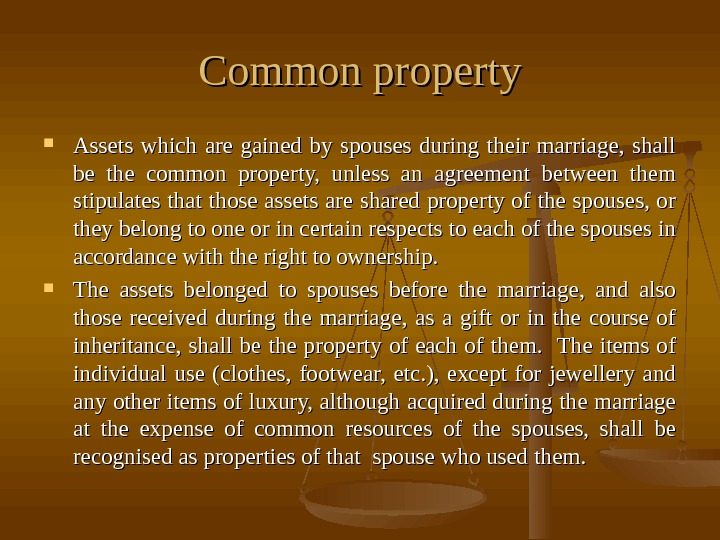
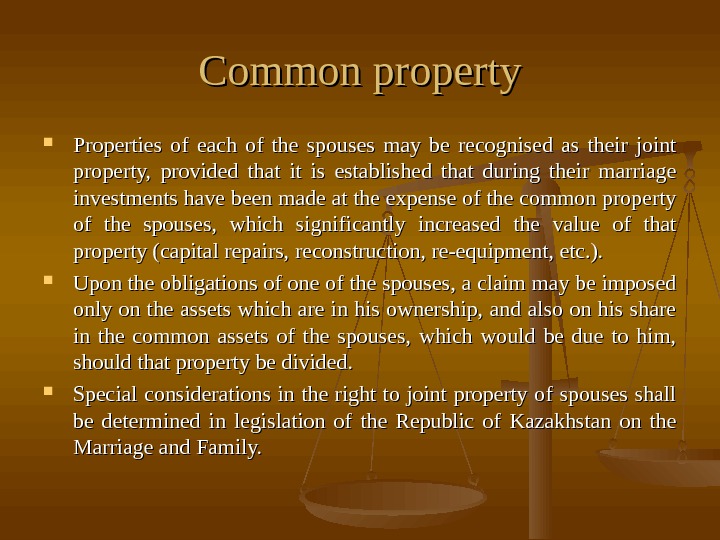
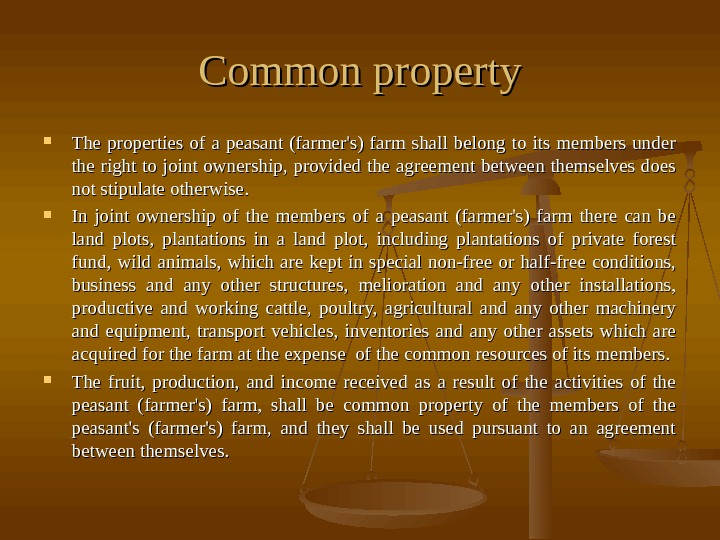
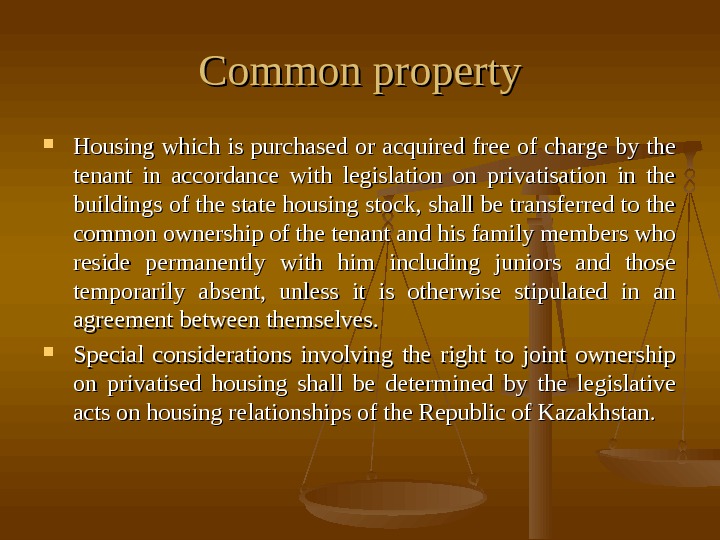
- Размер: 119 Кб
- Количество слайдов: 18
Описание презентации CIVIL LAW Lecture 11 Common property по слайдам
 CIVIL LAW Lecture
CIVIL LAW Lecture
 Common property Property which is in the ownership of two or more persons shall belong to them under the right of common ownership. Property can be in common ownership with the determination of the share of each of the owners in the ownership right ( shared ownership ) or without determining such shares ( joint property ). ). Common ownership of any assets shall be shared ownership, except for the cases where the law stipulates the formation of joint ownership of the property.
Common property Property which is in the ownership of two or more persons shall belong to them under the right of common ownership. Property can be in common ownership with the determination of the share of each of the owners in the ownership right ( shared ownership ) or without determining such shares ( joint property ). ). Common ownership of any assets shall be shared ownership, except for the cases where the law stipulates the formation of joint ownership of the property.
 Common property Common ownership shall emerge when two or several persons receive the property which may not be divided without changing its designation (indivisible items), or may not be divided by virtue of law. Common ownership on divisible assets shall emerge in the cases which are stipulated in legislative acts or an agreement. Upon consent of the participants of common joint property, and in the case of a failure to reach consensus, upon the decision of a court, common shared ownership of participants may be established with regard to the common property.
Common property Common ownership shall emerge when two or several persons receive the property which may not be divided without changing its designation (indivisible items), or may not be divided by virtue of law. Common ownership on divisible assets shall emerge in the cases which are stipulated in legislative acts or an agreement. Upon consent of the participants of common joint property, and in the case of a failure to reach consensus, upon the decision of a court, common shared ownership of participants may be established with regard to the common property.
 Common property Where the size of the shares of participants of shared property may not be established on the basis of legislative acts and is not established by an agreement of all its participants, the shares shall be deemed to be equal. . An agreement of all the participants of a shared property may establish a procedure for determining or changing their shares in connection with the contribution of each one of them in the formation and the increase of the common property.
Common property Where the size of the shares of participants of shared property may not be established on the basis of legislative acts and is not established by an agreement of all its participants, the shares shall be deemed to be equal. . An agreement of all the participants of a shared property may establish a procedure for determining or changing their shares in connection with the contribution of each one of them in the formation and the increase of the common property.
 Common property A participant of shared property who carries out at his own expense, in compliance with the procedure established for the use of common property, its inseparable improvements, shall have the right to appropriate increase of his share in the right to the common property. The separable improvements of common property, unless it is otherwise stipulated in an agreement of the participants of shared property, shall become the property of the one of the participants who made them.
Common property A participant of shared property who carries out at his own expense, in compliance with the procedure established for the use of common property, its inseparable improvements, shall have the right to appropriate increase of his share in the right to the common property. The separable improvements of common property, unless it is otherwise stipulated in an agreement of the participants of shared property, shall become the property of the one of the participants who made them.
 Common property The property which is within the shared property can be disposed of only upon consent of all its participants (owners). Each participant of the shared property shall have the right at his discretion to sell, transfer as a gift, bequeath, or pledge his share, or to dispose of it in any other way in compliance with the pre-emptive right rules. When selling a share in the shared property to the third party, the other participants of the shared ownership shall have a pre-emptive right to purchase the share which is to be sold at the price at which it is to be sold and on other equal conditions. Refusal to exercise the pre-emptive right by other participants shall be expressed within one month – if it is share in the common right on immovables, and ten days – movables.
Common property The property which is within the shared property can be disposed of only upon consent of all its participants (owners). Each participant of the shared property shall have the right at his discretion to sell, transfer as a gift, bequeath, or pledge his share, or to dispose of it in any other way in compliance with the pre-emptive right rules. When selling a share in the shared property to the third party, the other participants of the shared ownership shall have a pre-emptive right to purchase the share which is to be sold at the price at which it is to be sold and on other equal conditions. Refusal to exercise the pre-emptive right by other participants shall be expressed within one month – if it is share in the common right on immovables, and ten days – movables.
 Common property The fruit, production and income from the use of the property which is in the shared ownership, shall become part of the common shared property. Subsequent distribution of the fruits, products and income shall be carried out between the participants of shared ownership commensurate to their shares, unless it is otherwise stipulated in the agreement between them. Each participant of the shared property shall participate in the payment of taxes, levies and any other payments with regard to their common property commensurate with his share, and also in the costs of its maintenance and preservation.
Common property The fruit, production and income from the use of the property which is in the shared ownership, shall become part of the common shared property. Subsequent distribution of the fruits, products and income shall be carried out between the participants of shared ownership commensurate to their shares, unless it is otherwise stipulated in the agreement between them. Each participant of the shared property shall participate in the payment of taxes, levies and any other payments with regard to their common property commensurate with his share, and also in the costs of its maintenance and preservation.
 Common property A share in the right to shared ownership shall be transferred to the acquirer through an agreement from the moment of concluding the agreement, unless the agreement of the parties stipulates otherwise. The moment of transfer of a share in the right to shared property in accordance with the agreement which is subject to the state registration or notary certification, shall be determined in accordance with paragraph 2 of Article 238 of the RK Civil Code, i. e. where an agreement to alienate assets is subject to state registration or notary certification, the right of ownership shall emerge with the acquirer from the moment of the registration or notary certification, and where both a notary certificate and the state registration of the agreement are necessary, then from the moment of its registration.
Common property A share in the right to shared ownership shall be transferred to the acquirer through an agreement from the moment of concluding the agreement, unless the agreement of the parties stipulates otherwise. The moment of transfer of a share in the right to shared property in accordance with the agreement which is subject to the state registration or notary certification, shall be determined in accordance with paragraph 2 of Article 238 of the RK Civil Code, i. e. where an agreement to alienate assets is subject to state registration or notary certification, the right of ownership shall emerge with the acquirer from the moment of the registration or notary certification, and where both a notary certificate and the state registration of the agreement are necessary, then from the moment of its registration.
 Common property The assets which are in the shared ownership may be divided between participants pursuant to the agreement between them. A participant of the shared property shall have the right to claim the appropriation of his share out of common shared property.
Common property The assets which are in the shared ownership may be divided between participants pursuant to the agreement between them. A participant of the shared property shall have the right to claim the appropriation of his share out of common shared property.
 Common property Joint common property shall exist in the following forms: the common property of spouses; the common property of members of a peasant (farmer’s) farm; the common property on privatised housing. Legislative acts may stipulate any other types of the joint common property. The joint common ownership shall be established and it shall exist, unless an agreement between its participants stipulates otherwise.
Common property Joint common property shall exist in the following forms: the common property of spouses; the common property of members of a peasant (farmer’s) farm; the common property on privatised housing. Legislative acts may stipulate any other types of the joint common property. The joint common ownership shall be established and it shall exist, unless an agreement between its participants stipulates otherwise.
 Common property 1)1) The participants of joint property, unless it is otherwise stipulated in an agreement between themselves, shall collectively possess and use common property. 2)2) The disposal of the assets which are in the joint ownership, shall be exercised with the consent of all the participants, which is presumed irrespective of which of the participants entered into the property disposal transaction. 3)3) Each of the participants of joint property shall have the right to enter into transactions disposing of the common property, unless it is otherwise indicated in an agreement of all the participants.
Common property 1)1) The participants of joint property, unless it is otherwise stipulated in an agreement between themselves, shall collectively possess and use common property. 2)2) The disposal of the assets which are in the joint ownership, shall be exercised with the consent of all the participants, which is presumed irrespective of which of the participants entered into the property disposal transaction. 3)3) Each of the participants of joint property shall have the right to enter into transactions disposing of the common property, unless it is otherwise indicated in an agreement of all the participants.
 Common property 4)4) A transaction which is entered into by one of the participants of the joint property, and which is related to the disposal of the common property, may be recognised as invalid upon the claim of the other participants on the motive that the participant who entered into the transaction lacked the requisite powers, only in a case where it is proved that the other party in the transaction knew or should have known of it. 5)5) When entering into the transactions which require the notary certification or state registration, the notarized consent of the other participants of joint property, to the commitment of the transaction must be obtained. Above rules (1) – (5) shall apply, unless it is otherwise stipulated by the RK Civil Code or any other legislative acts with regard to specific types of the joint property.
Common property 4)4) A transaction which is entered into by one of the participants of the joint property, and which is related to the disposal of the common property, may be recognised as invalid upon the claim of the other participants on the motive that the participant who entered into the transaction lacked the requisite powers, only in a case where it is proved that the other party in the transaction knew or should have known of it. 5)5) When entering into the transactions which require the notary certification or state registration, the notarized consent of the other participants of joint property, to the commitment of the transaction must be obtained. Above rules (1) – (5) shall apply, unless it is otherwise stipulated by the RK Civil Code or any other legislative acts with regard to specific types of the joint property.
 Common property The division of common assets between participants of joint property, and also the appropriation of the share of one of them, may be carried out only provided that there has been a prior definition of the share of each of the participants in the right to common property. When dividing common property or appropriating a share out of it, provided it is not stipulated otherwise in the law or agreement by the participants, their shares shall be recognised as equal.
Common property The division of common assets between participants of joint property, and also the appropriation of the share of one of them, may be carried out only provided that there has been a prior definition of the share of each of the participants in the right to common property. When dividing common property or appropriating a share out of it, provided it is not stipulated otherwise in the law or agreement by the participants, their shares shall be recognised as equal.
 Common property A creditor of a participant of the shared or joint property, in the case of insufficiency of any other assets of the latter, shall have the right to impose a claim of appropriating the share of the debtor in the common property for the imposition of the claim upon it. In the event that the other participants of common property refuse the acquisition of the share of the debtor, the creditor shall have the right to claim through the court the imposition of the claim upon the share of the debtor in the common property by way of selling that share via a public auction. Where in such cases the appropriation of a share in kind is impossible or the other participants of the shared or joint property object thereto, the creditor shall have the right to claim the sale by the debtor of his share to the other participants of the common property at the price which is commensurate with the market value of that share, with a view to use the proceeds of the sale for the repayment of the debt.
Common property A creditor of a participant of the shared or joint property, in the case of insufficiency of any other assets of the latter, shall have the right to impose a claim of appropriating the share of the debtor in the common property for the imposition of the claim upon it. In the event that the other participants of common property refuse the acquisition of the share of the debtor, the creditor shall have the right to claim through the court the imposition of the claim upon the share of the debtor in the common property by way of selling that share via a public auction. Where in such cases the appropriation of a share in kind is impossible or the other participants of the shared or joint property object thereto, the creditor shall have the right to claim the sale by the debtor of his share to the other participants of the common property at the price which is commensurate with the market value of that share, with a view to use the proceeds of the sale for the repayment of the debt.
 Common property Assets which are gained by spouses during their marriage, shall be the common property, unless an agreement between them stipulates that those assets are shared property of the spouses, or they belong to one or in certain respects to each of the spouses in accordance with the right to ownership. The assets belonged to spouses before the marriage, and also those received during the marriage, as a gift or in the course of inheritance, shall be the property of each of them. The items of individual use (clothes, footwear, etc. ), except for jewellery and any other items of luxury, although acquired during the marriage at the expense of common resources of the spouses, shall be recognised as properties of that spouse who used them.
Common property Assets which are gained by spouses during their marriage, shall be the common property, unless an agreement between them stipulates that those assets are shared property of the spouses, or they belong to one or in certain respects to each of the spouses in accordance with the right to ownership. The assets belonged to spouses before the marriage, and also those received during the marriage, as a gift or in the course of inheritance, shall be the property of each of them. The items of individual use (clothes, footwear, etc. ), except for jewellery and any other items of luxury, although acquired during the marriage at the expense of common resources of the spouses, shall be recognised as properties of that spouse who used them.
 Common property Properties of each of the spouses may be recognised as their joint property, provided that it is established that during their marriage investments have been made at the expense of the common property of the spouses, which significantly increased the value of that property (capital repairs, reconstruction, re-equipment, etc. ). Upon the obligations of one of the spouses, a claim may be imposed only on the assets which are in his ownership, and also on his share in the common assets of the spouses, which would be due to him, should that property be divided. Special considerations in the right to joint property of spouses shall be determined in legislation of the Republic of Kazakhstan on the Marriage and Family.
Common property Properties of each of the spouses may be recognised as their joint property, provided that it is established that during their marriage investments have been made at the expense of the common property of the spouses, which significantly increased the value of that property (capital repairs, reconstruction, re-equipment, etc. ). Upon the obligations of one of the spouses, a claim may be imposed only on the assets which are in his ownership, and also on his share in the common assets of the spouses, which would be due to him, should that property be divided. Special considerations in the right to joint property of spouses shall be determined in legislation of the Republic of Kazakhstan on the Marriage and Family.
 Common property The properties of a peasant (farmer’s) farm shall belong to its members under the right to joint ownership, provided the agreement between themselves does not stipulate otherwise. In joint ownership of the members of a peasant (farmer’s) farm there can be land plots, plantations in a land plot, including plantations of private forest fund, wild animals, which are kept in special non-free or half-free conditions, business and any other structures, melioration and any other installations, productive and working cattle, poultry, agricultural and any other machinery and equipment, transport vehicles, inventories and any other assets which are acquired for the farm at the expense of the common resources of its members. The fruit, production, and income received as a result of the activities of the peasant (farmer’s) farm, shall be common property of the members of the peasant’s (farmer’s) farm, and they shall be used pursuant to an agreement between themselves.
Common property The properties of a peasant (farmer’s) farm shall belong to its members under the right to joint ownership, provided the agreement between themselves does not stipulate otherwise. In joint ownership of the members of a peasant (farmer’s) farm there can be land plots, plantations in a land plot, including plantations of private forest fund, wild animals, which are kept in special non-free or half-free conditions, business and any other structures, melioration and any other installations, productive and working cattle, poultry, agricultural and any other machinery and equipment, transport vehicles, inventories and any other assets which are acquired for the farm at the expense of the common resources of its members. The fruit, production, and income received as a result of the activities of the peasant (farmer’s) farm, shall be common property of the members of the peasant’s (farmer’s) farm, and they shall be used pursuant to an agreement between themselves.
 Common property Housing which is purchased or acquired free of charge by the tenant in accordance with legislation on privatisation in the buildings of the state housing stock, shall be transferred to the common ownership of the tenant and his family members who reside permanently with him including juniors and those temporarily absent, unless it is otherwise stipulated in an agreement between themselves. Special considerations involving the right to joint ownership on privatised housing shall be determined by the legislative acts on housing relationships of the Republic of Kazakhstan.
Common property Housing which is purchased or acquired free of charge by the tenant in accordance with legislation on privatisation in the buildings of the state housing stock, shall be transferred to the common ownership of the tenant and his family members who reside permanently with him including juniors and those temporarily absent, unless it is otherwise stipulated in an agreement between themselves. Special considerations involving the right to joint ownership on privatised housing shall be determined by the legislative acts on housing relationships of the Republic of Kazakhstan.

